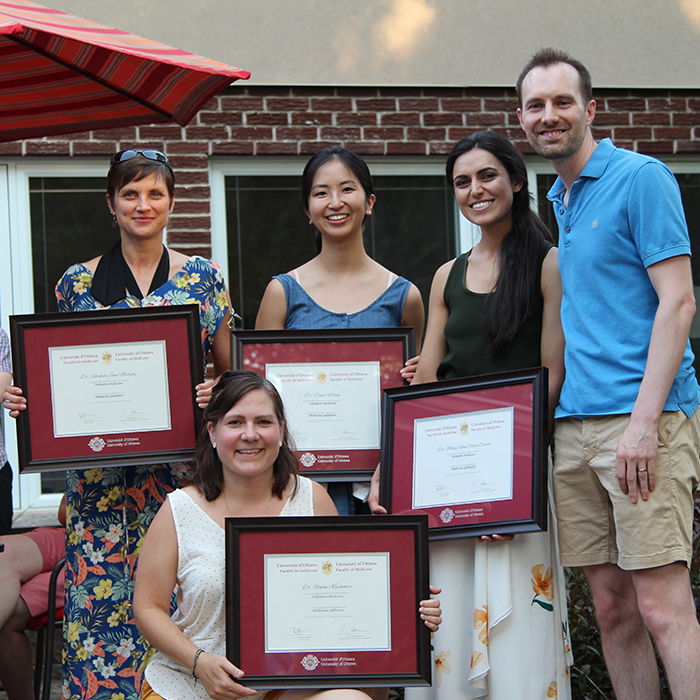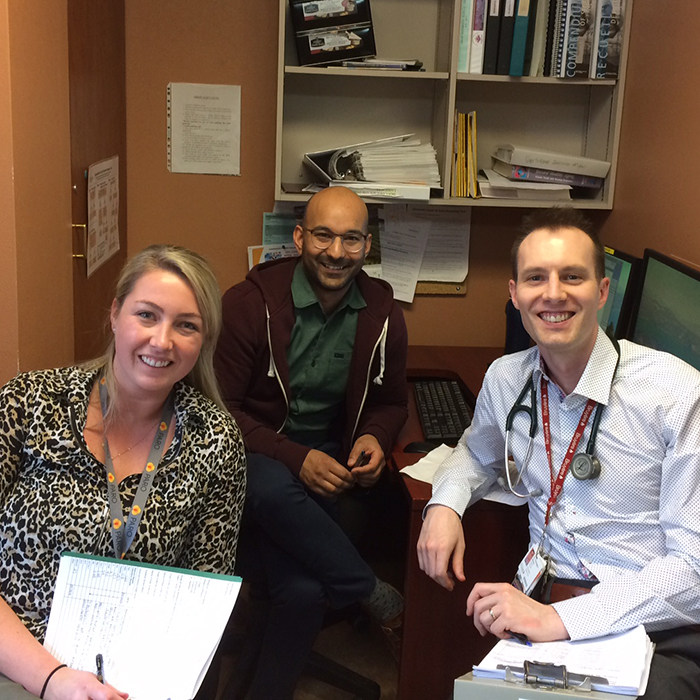The Ottawa Hospital (TOH)
Our trainees spend three blocks with the inpatient Supportive and Palliative Care Consultation Service at TOH; two at the General Campus, and one at the Civic Campus. The Supportive and Palliative Care Consultation Service is an interprofessional team that provides inpatient and out-patient ambulatory services. Consultations focus on symptom control, psychosocial and spiritual support. The trainee, under the supervision of a Palliative Medicine Consultant, works as a member of the interprofessional team providing inpatient consultation services.
The Civic Campus offers an opportunity to provide inpatient consult care to patients with palliative care issues in non-oncological diseases, including at the Ottawa Heart Institute. All of the oncology beds for the Integrated Cancer Program are located at the General Campus.
The General Campus is also home to the Acute Palliative Care Unit (aPCU). It is a 4-bed unit where care is provided as the attending team for patients that require the resources of an acute care hospital and palliative needs are the primary focus of their care. Residents may be integrated into the aPCU team during their inpatient consultation blocks at the General Campus.
Community Palliative Care - Regional Palliative Consultation Team (RPCT)
The RPCT supports, educates, and assists primary care providers in the community to provide high quality care to palliative care patients. Services include 24/7 telephone consultation, educational sessions, information on community palliative care resources, and community-based consultation services (in homes, long-term care facilities, hospices and other residential facilities).
Our trainees spend at least one block with the RPCT. The resident, under the supervision of a Palliative Medicine Consultant and the Advanced Nurse Practitioner Service Coordinator, works with the RPCT to provide telephone and home consultation. The trainee may also provide education to Family Medicine residents in their Palliative Care rotation, and assist with the care of the Family Medicine residents’ patients in the community, particularly those in hospices.
Community Palliative Care
The academic Division of Palliative Medicine collaborates with community-based palliative care teams to provide a training experience as the primary physician for palliative care patients in the community. This rotation compliments the consultative community experience of the RPCT.
Trainees spend at least one block under the supervision of one of the community palliative care teams in Ottawa. The trainee will shadow their physician-preceptor early in the rotation, and progress to performing independent visits, including to homes, long-term care facilities, hospices and other residential facilities.
Oncology
Our trainees participate in one oncology rotation, divided between Medical and Radiation Oncology. The Integrated Cancer Program, part of TOH, addresses the oncology needs of the eastern Ontario region. Under the supervision of attending medical and radiation oncologists, our trainees participate in the care of patients attending medical and radiation oncology ambulatory clinics at TOH Cancer Centre. Emphasis is placed on the most common malignancies seen in palliative care - lung, breast, prostate and colon cancers.
Electives
There are three blocks in which you can choose an elective that is related to Palliative Medicine and your career goals. Both clinical and academic/research electives are available. The Program Director assists our trainees to select electives to achieve their learning goals. Residents commonly choose (but are not limited to) electives in the following areas: pain medicine, medical subspecialties, additional community palliative care teams, spiritual care, scholarship, and others.
Palliative Care Clinics in the Cancer Center and Longitudinal Clinics
Our trainees attend a Palliative Care Clinic at The Ottawa Hospital Cancer Centre once every four weeks over the course of the Program. Dedicated blocks in these clinics are available as an elective. Trainees work closely with a Palliative Medicine Consultant to provide longitudinal follow up of ambulatory palliative care patients. Trainees gain experience in following patients as their symptom burden and psychosocial needs change over the illness trajectory. Similar to the RPCT and community rotations, the Longitudinal Clinics provide trainees with the competence to manage the unique aspects of community and ambulatory palliative care, as they differ from the inpatient setting.
The clinics also allow for each trainee to gradually increase their independence as they work with a consistent supervisor over the course of the Program.
Verbatims
Verbatims are an opportunity for palliative medicine trainees to improve their communication, collaboration, advocacy, and professionalism competencies using an interactive, low-stakes model. Communication techniques in challenging encounters (especially those involving conflict) are taught and rehearsed. The trainee learns how to reframe situations from conflict to collaboration when possible. Coaching and self-reflection allows them to balance the needs of others with their own self-care, which will lead to greater professional resilience. Coaching is provided one-on-one by a social worker or spiritual care professional. Sessions are held for one hour every other month.
Connection to Family Medicine
Residents have an option to complete a "half-day back" in a family medicine clinic in order to maintain and advance their core skills. The frequency of these clinics is variable, but often one half-day back every two weeks has worked well for interested residents.
Academic Activities
Rounds and Teaching
Trainees participate in teaching sessions and rounds several times per month. These sessions include clinical interprofessional team rounds, Journal Club, LEAP seminars, Morbidity & Mortality Rounds, Academic Half-Days (each week), and Regional Academic Rounds. Residents also assist with teaching second-year medical students during "Integration Week" in palliative care. There are also opportunities to provide additional teaching with the support of the Faculty.
Scholarly Project and Mentoring
Each trainee will complete a scholarly project over the course of the Program. The Faculty will assist the trainee to identify a topic and supervisor. Projects can be focused on research, medical education, or quality improvement. Each trainee is assigned a separate mentor in the Faculty that provides guidance, support, and career counselling.
Adaptability
Our program prides itself on being flexible. We value our history of training residents and fellows from varying career paths and backgrounds – from Family Medicine, to Emergency Medicine, to Pediatrics, to Critical Care. Our Program will work hard to accommodate to your individual learning goals, and we have the resources to help you succeed.
Rotation Schedule
The Family Medicine Enhanced Skills Program is designed for delivery over one year. The year consists of 13 blocks, each being approximately four weeks in length. The blocks are scheduled as core or elective rotations, with some rotations spanning more than one block.
A mock schedule is as follows:
B01 - Palliative Care Unit (St. Vincent)
B02 - Palliative Care Unit (St. Vincent)
B03 - Regional Palliative Consultation Team
B04 - Elective
B05 - Palliative Care Consults (TOH-General)
B06 - Palliative Care Consults (TOH-General)
B07 - Elective
B08 - Community Palliative Care
B09 - Palliative Care Consults (TOH-Civic)
B10 - Elective
B11 - Oncology
B12 - Palliative Care Unit (St. Vincent), Junior Staff Role
B13 - Palliative Care Unit (St. Vincent), Junior Staff Role
Training Sites
The Palliative Medicine Residency Program is based out of St. Vincent Hospital Hospital. Residents' training will take place across multiple sites in Ottawa.
1) St. Vincent Hospital Hospital
- Palliative Care Unit
- Regional Palliative Consultation Team
2) The Ottawa Hospital (TOH)
- General Campus
- Civic Campus
- Irving Greenberg Family Cancer Centre on the campus of the Queensway Carleton Hospital
3) Community Palliative Care
- Patient homes
- Retirement homes
- Long-term care
- Hospices


